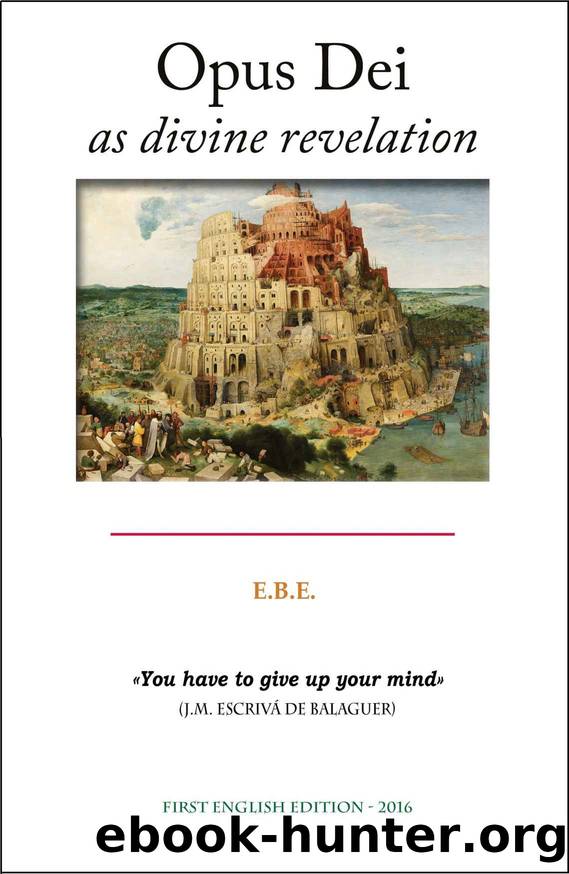Opus Dei as divine revelation by Ebe

Author:Ebe
Language: eng
Format: mobi
Will
The discipline proper to Opus Dei has effects on the will. Escrivá asks his children for a voluntary adherence to his doctrine. However, at the same time, his request seems rather an order.
«I have written that our perseverance in Opus Dei is absolutely voluntary. You are here because you feel like it (…). In Opus Dei no one can be coerced.»[497]
It is surprising how sometimes the founder teaches by giving orders. From the moment directors “take (a relative but effective) control” over members’ consciences —thanks to the imperative counsels, among others means— they are able to make members crave things that are contrary to their will. Escrivá's preaching style used to be in the form of dialog, as you can see above. However, in those dialogs, he is the one who asks the question and who answers it; no one else can be part of that “dialogue-preaching”. He says. “you are here because you feel like it”. He gives the answer before you can ask yourself: Why am I here? Had there been that possibility, the answer would have been very different from Escriva’s. “Why am I here? I do not know very well”, for example (especially if who asks the question joined Opus Dei when being a minor). However, Escrivá rules out that possibility.
The obsession with sexuality (and its control) leads Opus Dei to demand that all members have to talk about it in the weekly Chat. This government's determination to control members’ sexuality has to do with controlling people’s conscience (for instance, cf. the issue of abortion we saw earlier) and even with proselytism, in the case of supernumerary members’ sexuality (cf. footnote 411).
Let us recall that everything relating to sexuality is «stickier than pitch»[498]. As J. Estruch has pointed out, «Monsignor Escrivá uses the words sex and sexuality very little. Generally, he approaches this topic indirectly, avoiding the explicit use of the term». This is in the line with the idea that Escrivá had about feelings, which «become attached to everything you despise, even while you consider it despicable.»[499] The whole world of the sense seems to be problematic to Escrivá and his foundation (let us recall that celibate members are prohibit going to spectacles, theater, etc.). The answer to that problem is discipline.
Mortification, then, is an easy mean —taken from Christian tradition— of controlling instinct and the world of feelings. It does not matter if the use of hart shirt and disciplines is useful for the inner life of members. What matter is —for the Prelature— that those means are used two hours every day (hart shirt) and one time every week (disciplines) and all members render account of that in the Chat (weekly). The same can be said for poverty. It is not about living poorly but living with discipline in such a way that celibate members give up everything, have nothing of their own and rely on Opus Dei for everything. As a result, an emptiness or inner vacuum takes place.
The thought of death is another means of controlling members’ behavior.
Download
This site does not store any files on its server. We only index and link to content provided by other sites. Please contact the content providers to delete copyright contents if any and email us, we'll remove relevant links or contents immediately.
Resisting Happiness by Matthew Kelly(2895)
The Social Psychology of Inequality by Unknown(2318)
Designing Your Life by Bill Burnett(2284)
Day by Elie Wiesel(2251)
The Giving Tree by Shel Silverstein(1844)
Angels of God: The Bible, the Church and the Heavenly Hosts by Mike Aquilina(1631)
Human Design by Chetan Parkyn(1579)
Augustine: Conversions to Confessions by Robin Lane Fox(1476)
The Supreme Gift by Paulo Coelho(1455)
Hostage to the Devil by Malachi Martin(1404)
7 Secrets of Divine Mercy by Vinny Flynn(1396)
Jesus of Nazareth by Joseph Ratzinger(1389)
Dark Mysteries of the Vatican by H. Paul Jeffers(1347)
The Vatican Pimpernel by Brian Fleming(1344)
St. Thomas Aquinas by G. K. Chesterton(1315)
Saints & Angels by Doreen Virtue(1315)
My Daily Catholic Bible, NABRE by Thigpen Edited by Dr. Paul(1211)
Called to Life by Jacques Philippe(1206)
The Ratline by Philippe Sands(1169)
